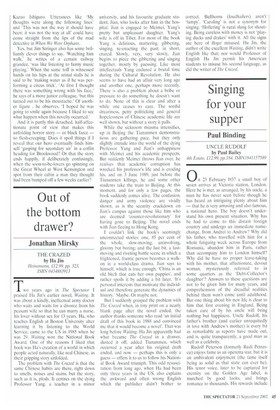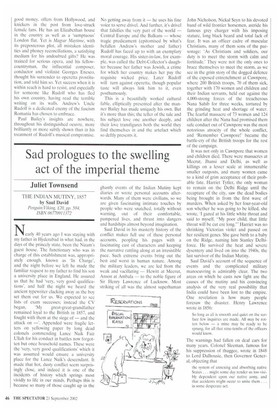Singing for your supper
Paul Binding
UNCLE RUDOLF by Paul Bailey
4th Estate, 1:12.99, pp.I84, ISBN1841157589
0 a 23 February 1937 a small boy of seven arrives at Victoria station, London. Here he is met, as arranged, by his uncle, a man he has never seen before though he has heard an intriguing plenty about him — that he is very amusing and also famous, a national hero. The boy doesn't understand his own present situation. Why has he had to come to this distant foreign country and undergo an immediate namechange, from Andrei to Andrew? Why did his father, who travelled with him for a whole fatiguing week across Europe from Romania, abandon him in Paris, rather than accompany him to London himself? Why did he have no proper leave-taking with his mother, that affectionate, devout woman, mysteriously referred to in some quarters as the Debt-Collector's daughter'? Answers to these questions are not to be given him for many years, and comprehension of the dreadful realities behind them won't come until adulthood. But one thing about his new life is clear to him that first evening in England. Being taken care of by his uncle will bring nothing but happiness. Uncle Rudolf, his father's brother (and earlier unrequitedly in love with Andrew's mother) is every bit as remarkable as reports have made out, and is, quite transparently, a good man as well as a celebrity.
Rudolf Peterson (formerly Rudi Petrescu) enjoys fame as an operetta star, but it is an ambivalent enjoyment (the fame itself being as solid as that state can ever be). His tenor voice, later to be captured for eternity on the Golden Age label, is matched by good looks, and brings romance to thousands. His rewards include good money. offers from Hollywood, and knickers in the post from love-struck female fans. He has an Elizabethan house in the country as well as a 'sumptuous' London flat. Yet is Magyar Maytime, with its preposterous plot, all mistaken identities and phoney reconciliations, a satisfying medium for his undoubted gifts? He was trained for serious opera, and his fellowcountryman, the influential composer, conductor and violinist Georges Enesco, thought his surrender to operetta prostitution, and told him so. Yet success when it is within reach is hard to resist, and especially for someone like Rudolf who has fled his own country, having read the terrible writing on its walls. Andrew's Uncle Rudolf is a dedicated enemy of the fascism Romania has chosen to embrace.
Paul Bailey's insights are nowhere, throughout his distinguished oeuvre, more brilliantly or more subtly shown than in his treatment of Rudolf's musical compromise. No getting away from it — he uses his fine voice to serve drivel. And further, it's drivel that falsifies the very part of the world — Central Europe and the Balkans — whose tragic predicament (epitomised by what's befallen Andrew's mother and father) Rudolf has faced up to with an exemplary moral courage. His sister-in-law, for example, was called the Debt-Collector's daughter because her father was Jewish, a crime for which her country makes her pay the requisite wicked price. Later Rudolf will turn against operetta, though popular taste will always link him to it, even posthumously.
This is a beautifully worked cultural fable, elliptically presented after the manner Bailey has made uniquely his own. But ifs more than this; the teller of the tale and his subject love one another deeply, and their love transfigures both the world they find themselves in and the artefact which so deftly presents it.











































































 Previous page
Previous page